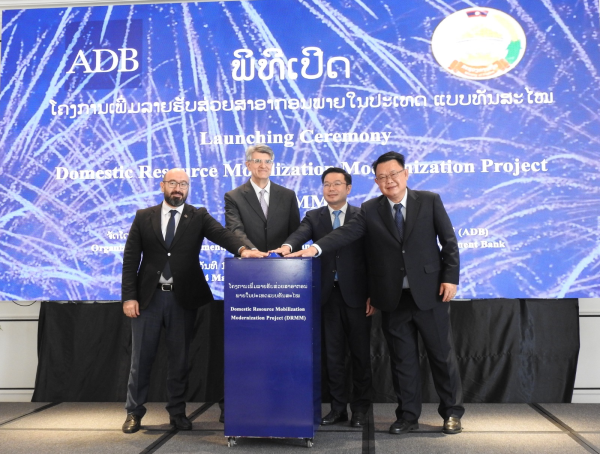KPL
The Ministry of Finance of the Lao People’s Democratic Republic (Lao PDR), in partnership with the Asian Development Bank (ADB), officially launched the Domestic Resource Mobilization Modernization (DRMM) Project in Vientiane on May 14.

The second from the left, Mr. Amr Qari, ADB Officer-In-Charge for the Lao PDR, Mr. Soulivath Souvannachoumkham, Vice Minister, Ministry of Finance; and Mr. Bounpaseuth Sikounlabouth, Director General, Tax Department, Ministry of Finance at the launching ceremony in Vientiane on May 14
(KPL)The Ministry of Finance of the Lao People’s Democratic Republic (Lao PDR), in partnership with the Asian Development Bank (ADB), officially launched the Domestic Resource Mobilization Modernization (DRMM) Project in Vientiane on May 14.
The project inception meeting was co-chaired by Mr. Soulivath Souvannachoumkham, Vice Minister of Finance; Mr. Amr Qari, Officer-in-Charge of the ADB Lao Resident Mission; and over 90 representatives from the Ministry of Finance, Provincial Finance Departments, line ministries, the private sector, and development partners attended the event.
In his opening remarks, Vice Minister Soulivath emphasized the significance of the initiative, describing it as “A pivotal step in strengthening the fiscal capacity and economic resilience of the Lao PDR.”
Backed by a USD 25 million loan and a USD 2 million grant from ADB, the DRMM Project is designed to modernize tax administration and improve the efficiency, transparency, and effectiveness of domestic revenue collection. The initiative aims to enhance fiscal sustainability and support inclusive economic growth.
While the Lao PDR has recorded steady economic growth—averaging 6.2% annually since 2010—its tax-to-GDP ratio remains low, at just 11.1% in 2022, one of the lowest in the Asia-Pacific region. The economy has heavily relied on resource-based, capital-intensive investments often financed through external borrowing, leading to growing fiscal vulnerabilities.

“The project addresses the urgent need for fiscal consolidation and enhanced domestic resource mobilization to reduce reliance on external debt,” noted Mr. Qari of ADB.
To address these challenges, the DRMM project will focus on digital transformation of taxpayer services, development of a modern e-invoicing system, enhanced data analytics capabilities, and establishment of a tax training center to build institutional capacity.
The project is part of the 2024-2028 cooperation framework between Laos and ADB, as well as the 9th Socio-Economic Development Plan (2021-2025) and the Tax Strategy Development Plan (2021-2025). By improving revenue management mechanisms, the government aims to maximize domestic resource mobilization, reduce reliance on external loans, and strengthen macroeconomic resilience.
This initiative marks a significant step toward a more efficient, transparent, and sustainable tax system, ensuring Laos’ long-term fiscal health.
By the end of the project, tax revenue is expected to increase to at least 14% of GDP, with 75% of businesses registered with tax identification numbers. These achievements are anticipated to help reduce public debt and ensure more equitable and sustainable financing for public services.
“This project is not just about reforming tax systems,” the Vice Minister emphasized. “It is about building a transparent, modern, and inclusive economic future for the Lao PDR.”
The Ministry of Finance will lead the project’s implementation through a Project Steering Committee comprising senior representatives from key ministries and agencies. A Project Management Unit (PMU) and Project Implementation Unit (PIU) have been established, with the Tax Department overseeing core operations such as procurement, financial management, reporting, and coordination with stakeholders.
ADB’s extensive experience in domestic resource mobilization reforms across Asia will be instrumental in ensuring the project reflects international best practices adapted to the Lao context.
KPL